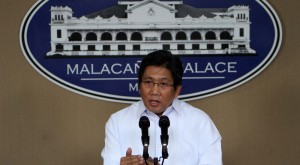Palace warns power woes ‘doomsayers’
MANILA, Philippines—Malacañang on Tuesday cautioned industry players and stakeholders against “drawing scenarios” creating fear over the country’s power supply, saying that the Department of Energy was monitoring the situation every hour.
Communications Secretary Herminio Coloma said the government was “diligently focused on the situation,” which he described as very dynamic.
“In the whole 24-hour cycle, there is hourly monitoring,” he told reporters. “The flow of electricity nationwide is seen. How base plants perform, the peak loads, they are monitored. The augmentation [in supply] that’s needed is identified.”
A common fear is that there might not be enough electricity during the summer months when energy demand is usually high.
Exerting maximum effort
Article continues after this advertisementArticle continues after this advertisement
Coloma maintained that “there is no tightness in supply in Luzon and the Visayas compared with Mindanao.” He said the key to solving the energy problem in the South was to ensure the stability of power supply.
“The Department of Energy continues to monitor the power situation nationwide to ensure stability of supply and electric power rates, especially during the summer months,” he said.
“Government is exerting maximum efforts to prevent power outages or brownouts.”
Asked if fears of looming brownouts outside of Mindanao were baseless, Coloma said: “Instead of drawing scenarios that would create fear, it’s better to focus our attention on positive steps like what the government is doing to ensure the stability of power supply and ensure that there would be no power outages.”
The Palace urged power industry players to focus on “cooperation” to address the energy problem. “Instead of discussing shortage, why not focus on having enough [supply], right?” he said.
“We would like to point out that the President and the administration act with a sense of urgency in implementing the priority programs of the Philippine Development Plan, including those pertaining to the adequacy of energy supply and the stability of power rates.”
